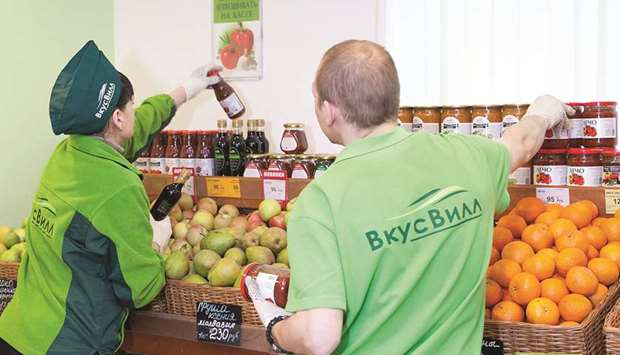It’s cucumber season in Russia, and wicker baskets are piled high with them in a store that’s part of the popular Moscow supermarket chain VkusVill. Juicy-looking apples and gorgeous tomatoes are vying for shoppers’ attention as well.
More than just about any other food business in the Russian capital, VkusVill, which translates roughly as Flavourville, focuses on regional produce.
Be it minced meat or cheese, everything for sale is raised, grown or made in the surrounding area, says spokesman Yevgeny Shchepin.
“We sell pure products that contain only what’s written on the label. There are no hidden additives, substitutes or preservatives,” he tells DPA.
While regional food has long been prized in many other countries, Russians didn’t turn to homegrown fare in earnest until 2014, when the US and European Union spearheaded sanctions against Russia for its annexation of Ukraine’s Crimea region and support for separatists in eastern Ukraine.
Russia retaliated by banning food imports from the countries imposing sanctions.
Prior to the tit-for-tat, it’s estimated that more than 60 per cent of the food in big cities such as Moscow was imported. Ever since, Russians have had little choice but to consume domestic meat, milk and vegetables – or go hungry.
What Russia doesn’t produce itself is now brought in from places like Central Asia, North Africa and South America.
In June, President Vladimir Putin extended Russia’s counter-sanctions until the end of 2018 – “great news for domestic agriculture,” in the words of Agriculture Minister Alexander Tkachev.
Protectionism, besides revenge, undoubtedly played a role in the move. Tkachev says the embargo on Western food imports should be extended another 10 years, as it encourages investment in the Russian food sector.
“We’re not losing anything, we’re only benefiting,” he commented.
Not all experts are so sure. Sans embargo, food in Russia would be 3 per cent cheaper on average, according to a report by the Russian business newspaper RBK, citing researchers at the Russian Presidential Academy of National Economy and Public Administration. This, they say, amounts to some 4,400 roubles (about 75 dollars) per capita per year.
For the people running VkusVill, the embargo is good for business.
Take cheese, for instance, points out Shchepin. Now that Western cheese has virtually disappeared from store shelves, sales of the Russian variety – hardly a favourite among cheese lovers – have risen.
“That was very surprising to us,” Shchepin said. “Our producers now believe they could even sell their cheese at higher prices if the embargo were suddenly lifted.”
It should be mentioned that VkusVill’s suppliers are small-scale producers. Consumers remain highly critical of the quality of mass-produced Russian cheese.
VkusVill radiates whole-food healthfulness. The company logo is deep green, and employees wear green fleece jackets. The stores, ranging in area from 80 to 220 square metres, are smaller than those of its competitors. The packaging is plain, without colourful pictures, and contains essential information only. The minimalist message is: Appearances are unimportant – it’s what’s inside that counts.
Andrei Krivenko, 42, founder and CEO of VkusVill, is feted like a rock star in business publications. He dresses casually, underscoring his relative youth, and is relaxed when he gives interviews.
Krivenko, who studied physics and accounting, began his first business, a dairy produce chain called Izbenka, with little start-up capital in 2009. It quickly took off, and three years later he founded VkusVill. He’s mum about the company’s revenues and profits, but the Russian business daily Vedomosti reported experts as putting revenues at 5.6 billion roubles in 2015 and 15 billion in 2016, with 28 billion roubles possible this year.
The chain now has 500 suppliers. Despite the Western sanctions and nearly three-year recession – low oil prices and dwindling foreign investment were also to blame – it has managed to open as many as five new stores a week at times.
There are now about 360 of them, with a target of 1,000 within three years. Nevertheless, VkusVill plans to keep its regional character by confining itself to the greater Moscow area.
Meanwhile, more and more Russian entrepreneurs are jumping on the bandwagon for regional produce.
A popular hamburger restaurant in central Moscow uses local meat and also sells juicy steaks from a refrigerated counter for frying at home. A small butchery with a handful of shops sells meat from the Tver region north of Moscow – at high prices, in contrast to VkusVill.
The Russian entrepreneurs association Opora Rossii is banking on sanctions continuing for a long time to come.
“Why do we need expensive Polish apples when we’ve got Russian apples?” remarked Yuri Savelov, a member of the group’s executive committee, to the Russian radio station Kommersant FM.
If Western imports returned to the Russian market tomorrow, he added, most Russian producers would have a world of problems. - DPA

VkusVill, a Moscow grocery store chain, radiates whole-food healthfulness. The company logo is deep green, and employees wear green fleece jackets.
